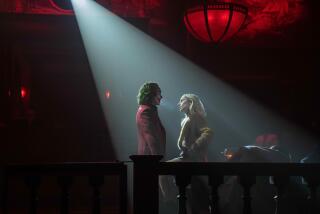Itinerary: Movies and Music
It’s a funny thing that early movies are called “silents,” because there was almostalways music. In fact, music has been such an important part of motion pictures that the academy started handing out Oscars for original song and scoring in 1934, five years before it added a separate cinematography category.
Still, film scores got short shrift from the music world until recent decades, when they first were added to pops orchestra concerts. Now, it’s widely recognized that some great composers did some of their best work for the screen.
This weekend, there are several opportunities to see how movies and music interact, or how they handle the same material. Look and listen.
Tonight
Love it or hate it, “Dancer in the Dark” is the only film musical in theaters right now. It concerns Selma, a saintly mother who is going blind from a hereditary disease and who saves her meager factory wages so her son can have a vision-saving operation. Her life is full of suffering, but her daydreams are colorful musical numbers. The Times’ Kenneth Turan called it “that most morose of musicals.” Many critics, including Turan, cite Bjork--the Icelandic pop singer who plays Selma and composed all the music--as the high point.
Friday
Quincy Jones’ music for “In Cold Blood” (1967) earned him an Oscar nomination, and he’ll be at the Academy of Motion Picture Arts and Sciences (8949 Wilshire Blvd., Beverly Hills. 8 p.m. Doors open at 7 p.m. $5, as available. [310] 247-3600) to discuss his work with other members of the cast and crew after a screening of a restored print of the film. Adapted from Truman Capote’s fact-based book, “In Cold Blood” is the story of the senseless murder of a family in Kansas by two petty criminals. It might give “Dancer in the Dark” a run for its money in the bleakness department. Richard Brooks, also Oscar nominated, wrote the script and directed; Robert Blake and Scott Wilson play the killers.
Saturday
Contrast what Brooks and Jones did with “In Cold Blood” to the work of composer Mikel Rouse, whose new work, “Failing Kansas,” was also based on Capote’s book. Rouse calls it an “opera”; others might call it a multimedia theater piece. Rouse performs solo, backed only by video images by artist Cliff Baldwin. The libretto--performed in a distinct metered style--uses actual testimony about the murders. He also incorporates portions of songs written by one of the killers, and Pentecostal hymns from the period. “Failing Kansas” plays Friday and Saturday at 8 p.m. in Founders Hall (Orange County Performing Arts Center, 600 Town Center Drive, Costa Mesa. $18. [949] 553-2422, tickets through Ticketmaster).
Sunday
“Aaron Copland and the Sound of the Americas”--a festival marking the 100th anniversary of the composer’s birth--focuses on his contribution to film.
The festival opens Sunday with a gala dinner and screening of William Wyler’s “The Heiress” (1949), which features some icy music by Copland. Following a 5:30 p.m. reception, there will be a panel discussion, with the film at 7:15 p.m. at the Beckman Center (National Academies of Sciences and Engineering, 100 Academy, Irvine. $75. [714] 755-5799). A screening of “Of Mice and Men” (1939), which also has a Copland score, is Monday at 7:30 p.m. for $8. The Pacific Symphony will give a “Copland in Hollywood” concert at the Orange County Performing Arts Center on Nov. 15 and 16 at 8 p.m. and Nov. 18 at 3:30 p.m.
More to Read
The biggest entertainment stories
Get our big stories about Hollywood, film, television, music, arts, culture and more right in your inbox as soon as they publish.
You may occasionally receive promotional content from the Los Angeles Times.










